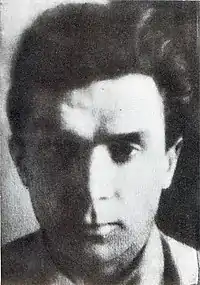Mykola Khvylovy
Mykola Khvylovy (Ukrainian: Микола Хвильовий [mɪˈkɔlɐ xwɪlʲoˈwɪj]; December 13 [O.S. December 1] 1893 – May 13, 1933) was a Ukrainian writer and poet of the early Communist era Ukrainian Renaissance (1920–1930).
Mykola Khvylovy | |
|---|---|
 Mykola Fitilov | |
| Born | Mykola Grigorovich Fitilov December 1, 1893 Trostyanets, Russian Empire |
| Died | May 13, 1933 (aged 39) Kharkiv, Ukrainian SSR |
| Pen name | Khvylovy |
| Occupation | writer, poet, security officer |
| Language | Ukrainian |
| Nationality | Ukrainian |
| Period | 1921-1933 |
| Genre | novel |
| Literary movement | impressionism, socialist realism |
Biography
Born as Mykola Fitilyov in Trostyanets, Kharkov Governorate to a Russian laborer father and Ukrainian schoolteacher mother. In 1916 he graduated from the Bohodukhiv Gymnasium, in 1919 he joined the Communist Party. In the same year he became the chief of local Cheka in Bohodukhiv povit. He moved to Kharkiv in 1921 and involved himself with writers connected to Vasyl Blakytny and the paper Visti VUTsVK (news from All-Ukrainian Central Executive Committee). In 1921, with Volodymyr Sosiura and Maik Yohansen, he signed the literary manifesto ‘Our Universal to the Ukrainian Workers and Ukrainian Proletarian Artists’ (published in the collection Zhovten’). In the same year his poem ‘V elektrychnyi vik’ (In the Electrical Age) and his poetry collection Molodist’ (Youth) were published.
In 1922, he began to focus more on prose writing. His initial collections Syni etiudy (Blue Etudes, 1923) and Osin’ (Autumn, 1924) generated approval from critics like Serhiy Yefremov, Oleksander Biletsky, Volodymyr Koriak, Yevhen Malaniuk and Dmytro Dontsov. His impressions of the work as a CheKa officer are reflected in his 1924 novel "I (Romance)", the hero of which - the head of the local Cheka - sentenced his mother to death in the name of the ideals of the revolution.
Briefly a brief member of the literary organization Hart (Hardening), Khvylovy later became critical of it and became a key leader of the VAPLITE organization of Ukrainian "proleteriat" writers. In April 1933 the secret police arrested Mykhailo Yalovy – former head of VAPLITE, closest companion and ally of Khvylovy. Yalovy died in prison.
Because of Stalin's repressions against his friends in the pro-Ukrainian Communist movement, Khvylovy committed suicide on 13 May 1933 in front of his friends in his apartment in Kharkiv. His suicide note said: "Arrest of Yalovy - this is the murder of an entire generation ... For what? Because we were the most sincere Communists? I don't understand. The responsibility for the actions of Yalovy's generation lies with me, Khvylovy. Today is a beautiful sunny day. I love life - you can't even imagine how much. Today is the 13th. Remember I was in love with this number? Terribly painful. Long live communism. Long live the socialist construction. Long live the Communist Party."
After his death, his works were banned in the Soviet Union and because of his symbolic potency were mostly not permitted until near the end or after the collapse of the Soviet Union.
Works
Khvylovy wrote both poetry and short stories. His short stories are best known for their difficult narrative forms and complicated imagery.
A novel, titled Valdshnepy (The Woodsnipes), remained unfinished and unpublished when he died. Its second part — the first published in Vaplite in 1927 — had been confiscated.
He wrote a number of pamphlets presenting his views of the connection between politics and art. He advocated an orientation toward cultural trends in Western Europe in order in loosen Ukraine's dependence on Russian forms and inspiration. His pamphlets created a major controversy and divided representatives of the budding Ukrainian literary scene and created tensions with the authorities. In the second series, Dumky proty techyi (Thoughts against the Current), which appeared in Kul’tura i pobut in November–December 1925 and separately in 1926, Khvylovy further developed his argument against the ‘cult of epigonism.’ By adopting a psycho-intellectual orientation on Europe, he argued, Ukrainians can enter onto their own path of development.
Leaving aside poetry, from which the writer soon turned to prose, the work of M. Khvylevy following G. A. Kostyuk can be divided into three periods:
1921-1924 - the time of the experiment and the search, to which the plotless romantic, lyrical, everyday satirical studies and the stories “Life” (Zhittya), “Puss in Boots” (Kit at Chobotyakh), “On the Deaf Road” (On the Deaf Hat) belong, “Editor Clark”, “Blue Leaf Fall” (Blue Leaf Fall), “Pig” (Pig), “Arabesques”, the short story “I” and others. 1925-1930 - the period of creative maturity, the statement of style, theoretical understanding of art and a clear focus on the plot: the satirical stories “Ivan Ivanovich” and “The Examiner”, the socio-psychological novel “From Variable Biography” (Iz Varinoï biografiï), the novel “Mother” (Mati), the story "Sanatorium zone" (The story about the sanatorium zone) and the novel "Woodcocks", polemic pamphlets "Kamo ryadesh?", "Ukraine or Little Russia?" and so on. 1931-1933 - “the period of heroic patience”, the period of defeats, retreats, and recent attempts to find a place in the new emerging mainstream. A number of critics believe that after abandoning his views in penitential letters, Khvylovy ceased to exist as a writer. Then Khvylovy tried to rehabilitate himself in the eyes of the party leadership and dissociated himself from Khvylevism. The writer became entangled in a dangerous game and lost in a fight with the party leadership. Hopelessness led to a tragic ending. Dontsov believed that even if Khvylyovy himself pressed the trigger of the revolver, Moscow put the weapon in his hand. The last stage of his work includes “Hunting Stories” (Mislivsky Opovidannya; the writer was an avid hunter), “From the Laboratory” (3 laborers), “Future Miners” (Maybutny Shakhtari), etc.
External links
| Wikisource has original works written by or about: Mykola Khvylovy |
| Preceded by Mykhailo Yalovy |
Director of Chervony Shliach 1927 |
Succeeded by Volodymyr Zatonsky |